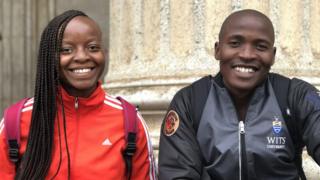‘I never thought I could afford to go to university’
Vuyo Ndata had nearly given up hope of going to university – but largely thanks to protests by South African students over high tuition fees – he is now a second-year undergraduate in Johannesburg at the age of 30.
His fees are being paid for by the government, which was prompted to deliver on a long-promised commitment to free education by the nationwide demonstrations, which rocked the country in 2015 and 2016.
Known by the hashtag #FeesMustFall, they were the largest student protests since the end of apartheid in 1994.
During white-minority rule in South Africa, many black students were denied access to prestigious institutions – and high tuition fees have been blamed for continued inequality over the last 25 years.
“I can’t put into words how honoured I am to be here. I never thought it would happen to someone like me,” says Mr Ndata, who is from Queenstown, a small town in the Eastern Cape province.
He is one of the first beneficiaries of the new scheme, introduced last year, for those from families with a combined income of less than 350,000 rand (£18,760; $24,270) a year.
“My brother is the sole breadwinner at home and was relieved when I got the grant because he is a teacher and doesn’t earn much,” says the Wits University student, who finished school in 2006 and only had ad-hoc jobs until he enrolled for a degree to become a teacher.
Apartheid and education:
Kgomotso Malatjie, a first-year Wits student from the rural province of Limpopo who is the first in her family to go to university, shares his relief.
“My mother had been stressing about me going to varsity. It was a difficult time for my family, they would have had to go hungry just for me to go to school and knowing that broke my heart. That’s why I was praying I would get the funding,” the 18 year-old aspiring nurse told me.
“My mother recently lost her policing job and things are difficult. Now she just has to worry about taking care of my little sister’s education.”
‘Missing middle’
Over the last two years, education officials say the scheme has led to an increase in students from poor backgrounds accessing higher education.
“The poorest of the poor make up 22% of the students at our institution,” Wits University’s Vice-Chancellor Adam Habib told the BBC.
There has also been a big improvement in the numbers of students coming back for their second year at Wits.
“What we’ve seen is that returning students have increased. These are students who were initially left out because after first year they did not have money to continue with their education,” say Mr Habib.
More on FeesMustFall:
But it is the fate of the “missing middle” that is of real concern to the vice-chancellor, who oversees 23,500 undergraduates and 13,500 postgraduates at Wits.
These are the students who are “too rich to qualify for the scholarship but in reality too poor to afford their education” – and make up 65% of students at the university.
Institutions are encouraged to help these students secure alternative funding, either through a bursary or donor funding, but even some of those who secure help find they are forced to drop out, especially after living expenses are added.
Students are often required to pay off outstanding debts before they can graduate and can find it difficult to get a job to repay their loans given the unemployment rate of 27%.
‘Sleeping in libraries’
In another part of Wits’ sprawling campus, a group of students who took part in the #FeesMustFall protests agree more still needs to be done.
“We still have students who sleep in libraries because they cannot afford accommodation,” says Lesego Letswalo.
“Many of us are not from Johannesburg but have to be here because this is where the good institutions are concentrated,” she says.
#FeesMustFall timeline:
Nkateko Muloiwa believes the focus should be less about providing free education and more about ensuring that there are more universities available across the country so families are not forced to send their children to the big cities at great expense.
“We just want free education but we have never spoken of the millions of young people that want to access education. We don’t have enough institutions to cater for everyone,” the student says.
Can South Africa afford to pay the bill?
University enrolment has more than tripled since the African National Congress (ANC) won South Africa’s first democratic elections in 1994, increasing from 495,356 to about 1.8 million.
But the World Bank recently raised concerns about South Africa’s free-education plan, warning that it was not sustainable if the economy only continued to grow at less than 2%.
In a statement earlier this year, it estimated that the costs of funding post-school education would more than double by 2022 to around $11.9bn a year.
It is not surprising then that the subject of free education has become a hot issue ahead of general elections on 8 May.
The parties’ manifestos differ on their approach:
Mr Habib believes free education is necessary.
“Our universities have to address inequality; you can’t address inequality if you don’t deal with the access problem and the quality problem,” the Wits vice-chancellor says.
“Poor communities have to be able to access the top universities. If they get quality education they get jobs and that leads to social mobility.”
Mr Ndata believes he would still be at home, facing poor prospects for his future, were it not for the student protests over fees.
“We truly owe everything to the students who stood up. People like us wouldn’t be here if it wasn’t for them,” he says.
“I’d like to encourage those stuck at home now [feeling] hopeless to get up. You need be determined; don’t give up on your dreams.”
Source: Read Full Article



